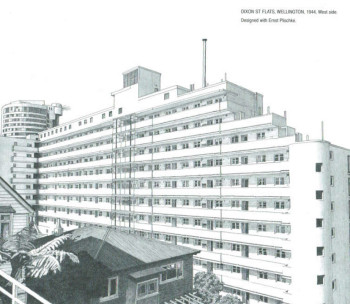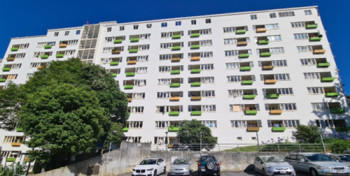Wellington region
With the strong and increasing demand for housing in the Wellington region, Kāinga Ora is working on a large build programme.
Community engagement
We recognise that people have different preferences for how they engage with us. That's why we offer various options, including one-on-one conversations, online resources, mailouts, or emails. This flexibility ensures everyone can access information in a way that suits them best. Our goal is to make sure everyone feels heard and informed, regardless of the method they choose to engage with us.
We have some helpful Wellington regional information [PDF, 8.1 MB] to provide an overview of our work in the area. You can also check out our latest e-newsletter and if you're interested in receiving future updates subscribe below. As new developments begin you may receive one of our New homes coming postcards [PDF, 121 KB] or see a signage board [PDF, 3.4 MB] on a property.
We attend existing community events regularly across the region to enable neighbours and community to speak with us in person and learn more about our work programme, and ask questions like:
- How sites are identified for new housing.
- Our design, planning and construction processes.
- How we place people into homes and manage our housing.
- How we support customers to live well in their homes and community.
Newsletters and community events
Sign up now to receive regular updates about what is happening in the Wellington region(external link).
- Transforming Lower Hutt: The Epuni Development - January 2025
- Wellington Kirihimete edition newsletter - December 2024(external link)
- Newsletter - August 2024(external link)
- Bristol Street, Trentham - open home invite - September 2024 [PDF, 351 KB]
- Reynold Street, Taita - open home invite - August 2024 [PDF, 350 KB]
- Newsletter - April 2024(external link)
- Te O community event - March 2024(external link)
- Newtown festival - February 2024(external link)
- Newsletter - November 2023(external link)
Interactive maps
Wellington area includes Kilbirnie, Lyall bay, Berhampore, Te Aro, Karori, Mount Cook, Miramar, Newtown, Lyall Bay, Strathmore, Khandallah and Johnsonville
Lower Hutt area includes Naenae, Avalon, Epuni, Alicetown, Petone, Stokes Valley, Waterloo, Moera, Waiwhetu, Boulcott, Taitā, Fairfield, Wainuiomata
Upper Hutt area includes Elderslea, Heretaunga and Trentham
Wairarapa area includes Carterton, Masterton, Featherston and Greytown
Kāpiti area includes Waikanae, Raumati South, Paraparaumu, Ōtaki
- Porirua Interactive Map(external link) or Eastern Porirua's large scale development, Te Rā Nui website(external link)
Porirua area includes Waitangirua, Ascot Park, Kenepuru, Titahi Bay, Cannons Creek and Rānui
Dixon Street Flats, Central Wellington
The Dixon Street Flats at 134 Dixon Street in central Wellington have been used as social housing for more than 80 years. However, the age, condition, and configuration of the 117 units within the 11-storey building mean they no longer fit the needs of our customers and not suitable for continued social housing use.
We have supported all the customers who were living in the Dixon Street Flats to move into other Kāinga Ora homes that that are warmer, healthier, and better suited to their needs.
What’s happening now with the building?
 We are boarding up the building while we decide what to do with it long-term. We have sought advice from Heritage New Zealand Pouhere Taonga and obtained resource consents from Wellington City Council so that we can secure the building and ensure its safety while it is vacant. The security measures that we are putting in place will help protect both the building and the surrounding area.
We are boarding up the building while we decide what to do with it long-term. We have sought advice from Heritage New Zealand Pouhere Taonga and obtained resource consents from Wellington City Council so that we can secure the building and ensure its safety while it is vacant. The security measures that we are putting in place will help protect both the building and the surrounding area.
The building’s age, condition, and configuration mean it needs a substantial amount of upgrading if we want to keep using it for social housing. For example, many of the building services need replacing, as well as the roof.
The size of the building and the extent of the work means this is likely to be very costly. We need to weigh up whether it is worth spending that money or whether we would better to invest that money on social housing elsewhere in Wellington, for example in our proposed Arlington development.
We could potentially redevelop the site with housing that is more suited to the needs of our customers today, but because the Dixon Street flats are heritage listed, it is unlikely we would get permission to demolish the building. Selling the building might also be an option.
We expect to make a decision on what we will do with the Dixon Street Flats by mid-2025.
The history of the Dixon Street Flats
 The Dixon Street flats are listed as a Category 1 Historic Place on the New Zealand Heritage List because when they were built in the early 1940s, they were only the second major social housing development in the country.
The Dixon Street flats are listed as a Category 1 Historic Place on the New Zealand Heritage List because when they were built in the early 1940s, they were only the second major social housing development in the country.
They are also considered one of the first examples of Modernist architecture in New Zealand.
The flats were designed by the housing construction department of the Ministry of Works, under the direction of government architect Gordon Wilson.
Want to get in touch with us?
Due to the scale of our public housing delivery, this site will be updated at least weekly with any new information available. If you have questions, please feel free to get in touch with our community engagement team at wellingtondevelopments@kaingaora.govt.nz
Uma na faafou le itulau: 5 September 2024
